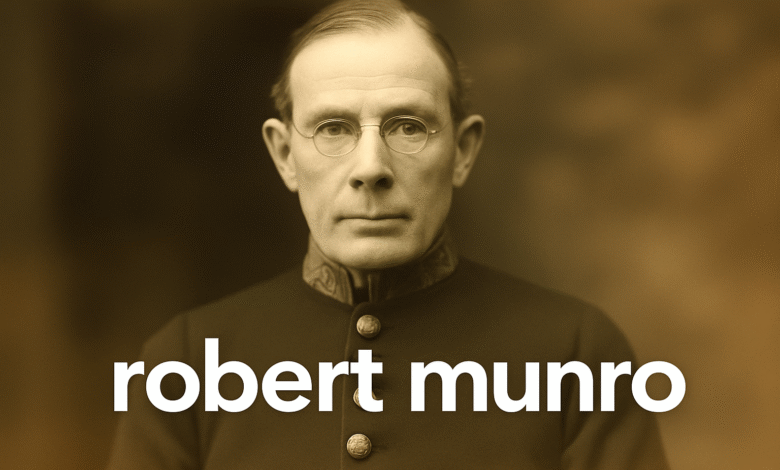Robert Munro: The Scottish Statesman Who Shaped Legal and Political History
From Lord Advocate to Baron Alness — The Lasting Legacy of a Distinguished Legal and Political Mind

Introduction
Robert Munro, 1st Baron Alness, stands as a distinguished figure in Scottish legal and political history. Born in 1868 in the Highlands of Ross‑shire, Munro’s career spanned the courtroom, the halls of Parliament, and the judicial bench. As Lord Advocate and Secretary for Scotland during some of the United Kingdom’s most challenging years, his contributions left a permanent mark on governance and justice. His elevation to peerage as Baron Alness symbolized the national recognition of his steadfast service, legal brilliance, and political integrity.
Quick Bio
| Attribute | Details |
|---|---|
| Full Name | Robert Munro, 1st Baron Alness |
| Date of Birth | 28 May 1868 |
| Place of Birth | Alness, Ross‑shire, Scotland |
| Date of Death | 6 October 1955 |
| Nationality | Scottish / British |
| Education | Aberdeen Grammar School, University of Edinburgh |
| Profession | Lawyer, Politician, Judge |
| Notable Titles | Lord Advocate, Secretary for Scotland, Lord Justice Clerk, Baron Alness |
| Marital Status | Married (twice), no children |
| Honors | GBE, PC, QC, DL |
Humble Beginnings in the Scottish Highlands
Robert Munro was born on 28 May 1868 in Alness, a small town in Ross‑shire, Scotland. Raised in a household grounded in religious and academic traditions, his father was Reverend Alexander Munro, and his mother Margaret Sinclair came from another devout clerical family. These influences played a pivotal role in shaping his disciplined, scholarly character.
Academic Pursuits and Legal Foundation
Munro received his early education at Aberdeen Grammar School, a respected institution known for producing distinguished Scotsmen. He then pursued a legal education at the University of Edinburgh, where he laid the foundation for a future career as one of Scotland’s most influential legal minds. In 1893, he was called to the Scottish Bar, officially beginning a professional journey that would span over five decades.
The Legal Career of Robert Munro
From Advocate to King’s Counsel
As an advocate, Robert Munro built a reputation for clarity of thought, articulate argument, and deep legal insight. By 1910, his excellence in law earned him the distinguished title of King’s Counsel (KC), marking him as one of the top legal minds in Scotland.
Counsel to Inland Revenue and Beyond
His early roles included serving as counsel to the Board of Inland Revenue, through which he gained key governmental exposure. His blend of intellectual precision and public service orientation naturally led him into politics, where he could shape the law not just in courts, but through legislation.
Political Ascension and National Leadership
Parliamentary Career and Lord Advocate Appointment
Munro entered Parliament as a Liberal MP for Wick Burghs in 1910. His oratory skills and legal mind soon gained recognition, leading to his appointment as Lord Advocate in 1913. This role placed him at the head of Scotland’s legal system, where he advised the Crown and government on constitutional and criminal matters.
Secretary for Scotland During World War I
Following the fall of the Asquith government, Munro retained his position under Prime Minister Lloyd George and was promoted to Secretary for Scotland in 1916. He held this cabinet role throughout the challenging years of World War I until 1922. During his tenure, Munro navigated complex issues like industrial disputes, Scottish national identity, and wartime civil governance.
Judicial Appointment and Peerage
Lord Justice Clerk and Lord Alness
After stepping back from Parliament, Munro was appointed Lord Justice Clerk in 1922—the second-highest judicial post in Scotland. His judgments were noted for fairness and legal clarity, and he became widely respected in judicial circles.
Elevated to Peerage as Baron Alness
In 1934, he was ennobled as Baron Alness, allowing him a lifetime seat in the House of Lords. This honor recognized his decades of public service and legal excellence. Though the barony lapsed upon his death in 1955 due to having no children, the name “Lord Alness” remains etched in Scotland’s legal history.
World War II Contributions and Public Service
Role in Churchill’s Wartime Government
In 1940, Winston Churchill appointed Munro as Lord-in-Waiting—a key role in parliamentary liaison and management within the House of Lords. He played this supportive but crucial role throughout World War II and into the post-war caretaker government of 1945.
Honors and Decorations
For his contributions to public life, Munro was made a Knight Grand Cross of the Order of the British Empire (GBE) in 1946. He also held the honorary post of Deputy Lieutenant of Edinburgh, symbolizing his continued commitment to civic service.
Personal Life and Relationships
Marriages and Family
Munro was married twice. His first wife, Edith Gwladys Evans, passed away in 1920. He later married Olga Marie Grumler in 1921. Neither marriage produced children, and thus his barony ended with his passing in 1955.
Character and Personal Reputation
Known for his quiet dignity, disciplined habits, and legal brilliance, Munro was respected across the political spectrum. He was not flamboyant, but effective—a man whose service was always driven by principle.
Legacy of Robert Munro
Enduring Influence in Law and Government
Robert Munro’s career is a blueprint for integrity in public life. From Parliament to the judiciary, his work emphasized fairness, justice, and national duty. As Lord Advocate and Secretary for Scotland, he shaped key legal and governmental developments during periods of upheaval and change.
Historical Assessment and Recognition
While not a widely celebrated public figure in popular culture, scholars and legal historians regard Munro as a pillar of early 20th-century Scottish governance. His contribution is remembered for balancing legal tradition with modern administrative demands.
Useful FAQ
Who was Robert Munro?
Robert Munro was a Scottish lawyer, judge, and Liberal politician who served as Lord Advocate, Secretary for Scotland, and later became Baron Alness.
What is Robert Munro known for?
He is known for his leadership in legal and political roles during World War I, and for serving as Lord Justice Clerk and later as a peer in the House of Lords.
Was Robert Munro married?
Yes, he was married twice—first to Edith Gwladys Evans, and then to Olga Marie Grumler. He had no children.
What honors did Robert Munro receive?
He was awarded the Knight Grand Cross of the Order of the British Empire (GBE) and was appointed to the Privy Council and the peerage.
When did Robert Munro die?
He died on 6 October 1955 at the age of 87.




